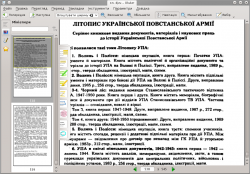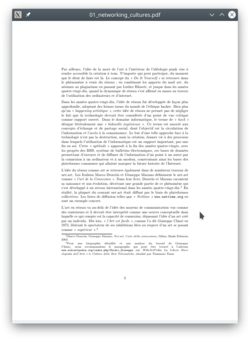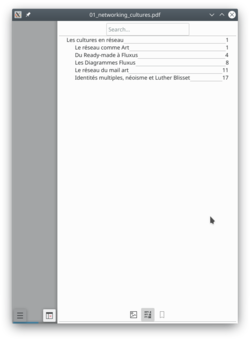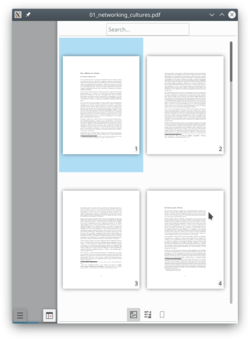Okular/uk: Difference between revisions
Updating to match new version of source page |
Updating to match new version of source page |
||
| Line 8: | Line 8: | ||
==Історія програми== | ==Історія програми== | ||
Its development began as part of Google's Summer of Code program. The description of the project can be found at [https://web.archive.org/web/20080921165821/https://developer.kde.org/summerofcode/okular.html KDE Developer's Corner]. | |||
В '''Okular''' поєднано чудові функціональні можливості [[Special:myLanguage/KPDF|KPDF]] і гнучкість у підтримці документів у різних форматах, зокрема PDF, Postscript, DjVu, CHM тощо. | В '''Okular''' поєднано чудові функціональні можливості [[Special:myLanguage/KPDF|KPDF]] і гнучкість у підтримці документів у різних форматах, зокрема PDF, Postscript, DjVu, CHM тощо. | ||
| Line 24: | Line 24: | ||
== Mobile Version == | == Mobile Version == | ||
Okular has a mobile version since version 0.16 release in February 2013 <ref>[https://okular.kde.org/news.php Release information]</ref>. The first version was based on the [https://community.kde.org/Plasma/Active active] framework. The mobile viewer was then ported to Kirigami in 2016 by Marco Martin<ref>[https://phabricator.kde.org/R223:eb1f73800e83b11e4a5ae93ac069893aa88f0eaa | Okular has a mobile version since version 0.16 release in February 2013 <ref>[https://okular.kde.org/news.php Release information]</ref>. The first version was based on the [https://community.kde.org/Plasma/Active active] framework. The mobile viewer was then ported to Kirigami in 2016 by Marco Martin<ref>[https://phabricator.kde.org/R223:eb1f73800e83b11e4a5ae93ac069893aa88f0eaa Commit port mobile version from plasma-framework to kirigami]</ref> and finally to Kirigami2 in 2017<ref>[https://phabricator.kde.org/R223:caf8820cf773316ce41d9a8c1f7357b3ffc3ef86 Commit port mobile version from kirigami to kirigami2]</ref>. | ||
The mobile version doesn't support all features | The mobile version doesn't support all features from the desktop version, but provide better touch support and a mobile interface. | ||
[[File:Okular_mobile_pdf_view.png|250px]] | [[File:Okular_mobile_pdf_view.png|250px]] | ||
| Line 48: | Line 48: | ||
By default, Okular follow the PDF specification and don't allow copying text from DRM protected files. However, there is an option in the settings to disable DRM limitations in <menuchoice>Settings -> General -> Program Features -> Obey DRM limitations</menuchoice> | By default, Okular follow the PDF specification and don't allow copying text from DRM protected files. However, there is an option in the settings to disable DRM limitations in <menuchoice>Settings -> General -> Program Features -> Obey DRM limitations</menuchoice> | ||
There was a small controversy in the Debian bug tracker a long time ago, about the default choice to Obey DRM limitations<ref>[https://lists.debian.org/debian-devel/2009/05/msg00879.html DRM and Okular in Debian bug tracker]</ref><ref>[https://lwn.net/Articles/335415/ DRM and Okular in LWM]</ref>. | There was a small controversy in the Debian bug tracker a long time ago, about the default choice to Obey DRM limitations<ref>[https://lists.debian.org/debian-devel/2009/05/msg00879.html DRM and Okular in Debian bug tracker]</ref><ref>[https://lwn.net/Articles/335415/ DRM and Okular in LWM]</ref>. The choice was then [https://tsdgeos.blogspot.com/2009/06/okular-pdf-and-drm.html explained] by an Okular/KPdf developer<ref>[https://tsdgeos.blogspot.com/2009/06/okular-pdf-and-drm.html Okular, PDF and file permissions]</ref>. | ||
=== PDF Signature and certificate === | === PDF Signature and certificate === | ||
Okular can verify if a PDF certificate is valid. But you can not yet create new signature. See [https://tsdgeos.blogspot.com/2019/01/okular-pdf-signature-certificate.html release note] for more information. | Okular can verify if a PDF certificate is valid. But you can not yet create a new signature. See [https://tsdgeos.blogspot.com/2019/01/okular-pdf-signature-certificate.html release note] for more information. | ||
== More Information == | == More Information == | ||
Revision as of 21:00, 3 February 2019
Для чого призначено Okular?
Okular — універсальна програма для перегляду документів, яку розроблено KDE. Okular може працювати на декількох програмних платформах, зокрема на Linux, Windows, Mac OS X, *BSD тощо.
Ви можете спостерігати за розробкою програми за допомогою її домашньої сторінки.
Історія програми
Its development began as part of Google's Summer of Code program. The description of the project can be found at KDE Developer's Corner.
В Okular поєднано чудові функціональні можливості KPDF і гнучкість у підтримці документів у різних форматах, зокрема PDF, Postscript, DjVu, CHM тощо.
На діаграмі обробки форматів документів ви знайдете докладний опис підтримуваних форматів та відповідних можливостей роботи з кожним з цих форматів.

Окрім можливостей перегляду документів у багатьох форматах, у Okular передбачено можливості вибору тексту, рецензування (створення анотацій), видобування файлів, вбудованих у документ, а також багато інших несподіваних можливостей. Знімки вікон Okular можна знайти за цією адресою.
Обговорити програму з розробниками та іншими користувачами можна на каналі IRC, мережі irc.freenode.org: #okular.
Якщо ви бажаєте взяти участь у розробці Okular, будь ласка, зв’яжіться з командою з розробки програми. До співпраці запрошуються не лише програмісти.
Mobile Version
Okular has a mobile version since version 0.16 release in February 2013 [1]. The first version was based on the active framework. The mobile viewer was then ported to Kirigami in 2016 by Marco Martin[2] and finally to Kirigami2 in 2017[3].
The mobile version doesn't support all features from the desktop version, but provide better touch support and a mobile interface.
You can test the mobile version in your PC by entering
okularkirigami
in your terminal.
Підказки і настанови
Рецензування документів та анотації
Якщо ви двічі клацнете на пункті одного з інструментів Рецензування (F6), ви зможете попрацювати над рецензуванням без потреби у повторному активуванні відповідного режиму.
Створені вами анотації можна зберегти у файлі PDF:
Типово, Okular зберігає анотації у локальному каталозі даних, окремо для кожного користувача системи. Починаючи з версії для KDE 4.9, можна зберегти анотації безпосередньо до файла PDF за допомогою пункту меню «Файл -> Зберегти як...», так, щоб їх можна було переглядати у інших програмах для перегляду PDF. Зауважте, що використання цієї можливості потребує Poppler 0.20 або новішої версії для звичайних документів PDF. Якщо документ PDF, анотації до якого ви створюєте, зашифровано, використання цієї можливості потребуватиме Poppler 0.22 або новішої версії.
DRM
By default, Okular follow the PDF specification and don't allow copying text from DRM protected files. However, there is an option in the settings to disable DRM limitations in
There was a small controversy in the Debian bug tracker a long time ago, about the default choice to Obey DRM limitations[4][5]. The choice was then explained by an Okular/KPdf developer[6].
PDF Signature and certificate
Okular can verify if a PDF certificate is valid. But you can not yet create a new signature. See release note for more information.
More Information
- Official KDE documentation
- Okular website
- Okular API documentation
- Okular phabricator project
- Okular git repository



